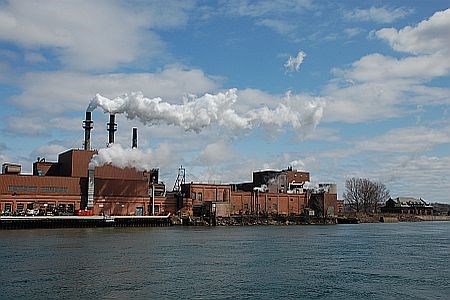The anticipated autumn surge of orders for catalogue-quality paper has St. Marys Paper returning back to full capacity this summer.
The Sault Ste. Marie maker of Super Calendar paper was calling back 100 laid off workers and firing up of two mothballed paper machines to meet a strengthening order book as U.S. publishers and big retailers head into overdrive leading into the American Thanksgiving and Christmas holidays.
All three of the mill's paper machines were expected back online by August 13 pumping out 655 tonnes daily.
“Clearly we're restarting (paper machines) 3 and 4 to satisfy client demand,” said company president Gord Acton.
The mill has an annual capacity of 240,000 tonnes of paper.
As paper markets softened earlier this year, just its workhorse No. 5 machine was operating. The two old paper machines were halted last spring followed by 100 temporary layoffs, including 60 in May.
The company was careful not to build up a huge inventory of paper it couldn't sell, but it was able to keep its U.S. customers supplied and maintain their market share. The company makes three grades of paper (marketed as Synpress, Sequel and Sequence) used in catalogues and flyers.
All of the laid-off workers in their 307-member workforce have been called back, said Acton.
Because of these seasonal fluctuations, Acton said the big challenge is to balance the order book and production to keep machines running consistently.
“The marketplace, as we've seen in the past, it can take turn which no person can predict. You clearly are out there gathering information and intelligence to make strategic decisions for the future.”
Making matters worse this year was the American black liquor tax credit which put Canadian pulp and paper makers as a disadvantage as the North American market was flooded with subsidized paper.
Acton said it's had some impact in St. Marys not being able to make greater inroads into the Canadian market.
Domestic buyers were switching from Super Calendar to Lightweight Coated Sheet (LWC) made by integrated U.S. pulp producers taking advantage of the American black liquor tax credit to reduce their costs of kraft pulp, the largest cost ingredient in LWC.
Black liquor is a pulp production byproduct of turning wood into pulp. It's regarded in the U.S. as an 'alternative fuel' to produce energy in mills.
Ottawa countered with a $1 billion lifeline for Canadian pulp and paper industry, but St. Marys was not able to take advantage of the federal black liquor aid package. As a ground wood mill, St. Marys does not product black liquor.
The company is giving serious study on diversifying its product mix and are working towards building a co-generation plant producing steam and electricity.
“Our business plan is to transition the mill from a single product paper mill (super calendar) to a business model that has paper, energy in two forms (steam and electricity), as well as new wave products made from fibre.”
St. Marys is working with outside groups and universities on these future products, said Acton. Without going into specifics, he said it involves proprietary knowledge shared between the company and other institutions.
The company continues to pursue the development of a 35-megawatt co-generation plant using wood waste to produce steam and electricity.
St. Marys filed an application with the Ontario Power Authority June 11 – which include details of an investment package --and is awaiting an answer from the OPA to buy into a province-wide power purchase initiative.
Though Acton wouldn't divulge the project costs, a Sault Ste. Marie news report in May during a company open house on the co-gen pegged the price tag at $170-million.
The privately-held company is in its second year of new management after being rescued from bankruptcy in 2007 from Vancouver businessman Ron Stern.
Acton, a local lawyer, helped spearhead an ownership group made up entirely of Sault investors. Former Algoma Steel president/CEO Denis Turcotte serves in an advisory capacity.
The company doesn't release financial details, but Acton said St. Marys is on track to realize the financial goals originally set out in 2007.
www.stmarys-paper.com




